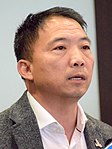
Back Kommunalwahlen in Hongkong 2019 German Elecciones locales de Hong Kong de 2019 Spanish انتخابات ۲۰۱۹ هنگ کنگ Persian Hongkongin paikallisvaalit 2019 Finnish Élections locales hongkongaises de 2019 French 2019年香港区議会議員選挙 Japanese 2019년 홍콩 구의회 선거 Korean 2019 ஆங்காங் உள்ளாட்சி தேர்தல்கள் Tamil Bầu cử Hội đồng quận Hồng Kông 2019 Vietnamese 2019年香港區議會選舉 Chinese
| |||||||||||||||||||||||||||||||||||||||||||||||||||||||||||||||||||||||||||||||||||||||||||||||||||||||||||||||||||||||||||||||||
All Elected Constituencies 452 (of the 479) seats in all Districts Councils | |||||||||||||||||||||||||||||||||||||||||||||||||||||||||||||||||||||||||||||||||||||||||||||||||||||||||||||||||||||||||||||||||
|---|---|---|---|---|---|---|---|---|---|---|---|---|---|---|---|---|---|---|---|---|---|---|---|---|---|---|---|---|---|---|---|---|---|---|---|---|---|---|---|---|---|---|---|---|---|---|---|---|---|---|---|---|---|---|---|---|---|---|---|---|---|---|---|---|---|---|---|---|---|---|---|---|---|---|---|---|---|---|---|---|---|---|---|---|---|---|---|---|---|---|---|---|---|---|---|---|---|---|---|---|---|---|---|---|---|---|---|---|---|---|---|---|---|---|---|---|---|---|---|---|---|---|---|---|---|---|---|---|---|
| Registered | 4,132,977 | ||||||||||||||||||||||||||||||||||||||||||||||||||||||||||||||||||||||||||||||||||||||||||||||||||||||||||||||||||||||||||||||||
| Turnout | 2,943,842 (71.23%)[1] | ||||||||||||||||||||||||||||||||||||||||||||||||||||||||||||||||||||||||||||||||||||||||||||||||||||||||||||||||||||||||||||||||
| |||||||||||||||||||||||||||||||||||||||||||||||||||||||||||||||||||||||||||||||||||||||||||||||||||||||||||||||||||||||||||||||||
 Map of the winning party by constituency | |||||||||||||||||||||||||||||||||||||||||||||||||||||||||||||||||||||||||||||||||||||||||||||||||||||||||||||||||||||||||||||||||
The 2019 Hong Kong District Council elections were held on 24 November 2019 for all 18 District Councils of Hong Kong.[2] 452 seats from all directly elected constituencies, out of the 479 seats in total, were contested. Nearly three million people voted, equivalent to 71 per cent of registered voters, an unprecedented turnout in the electoral history of Hong Kong. The election was widely viewed as a de facto referendum on the concurrent anti-extradition protests.[3]
All pro-Beijing parties suffered major setbacks and losses, including the flagship pro-Beijing party Democratic Alliance for the Betterment and Progress of Hong Kong (DAB), which received its largest defeat in history, losing 96 seats. Executive Councillor Regina Ip's New People's Party failed to obtain a single seat, and was ousted from all District Councils as a result.[4][5] Dozens of prominent pro-Beijing heavyweights lost their campaigns for re-election, including Junius Ho, a controversial anti-protest figure who had expressed support for the triads behind the mob attack in Yuen Long on 21 July.[4][5]
In contrast, the pro-democracy camp in conjunction with the localist camp achieved its biggest landslide victory in the history of Hong Kong, gaining absolute majority in votes and electoral seats in all of the 18 District Councils and tripling their seats from around 124 to about 388. The pro-Beijing parties can only retain their control in only one District Council due to their advantage in ex officio seats in the Islands District Council. Many pro-democracy candidates who actively participated in the protests were elected, including convenor of the Civil Human Rights Front (CHRF) Jimmy Sham.[4][5]
This election is described by some as potentially the last free election in Hong Kong, as the national security law and election overhaul imposed by Beijing would vet democrats for the next election. More than 70 per cent of elected District Councillors resigned or were disqualified over the following two years due to various reasons.
- ^ "Voter Turnout Rate". District Council Election 2019. Archived from the original on 25 September 2019. Retrieved 25 November 2019.
- ^ "Review of the Number of Elected Seats for the Sixth-Term District Councils" (PDF). Panel on Constitutional Affairs, Legislative Council of Hong Kong. Archived (PDF) from the original on 4 September 2017. Retrieved 4 September 2017.
- ^ Mahtani, Shibani; Leung, Tiffany; Kam, Anna; Denyer, Simon (24 November 2019). "Hong Kong's pro-democracy parties sweeping aside pro-Beijing establishment in local elections, early results show". The Washington Post. San Francisco Chronicle. Archived from the original on 30 March 2020. Retrieved 24 November 2019.
- ^ a b c Graham-Harrison, Emma (24 November 2019). "Hong Kong voters deliver landslide victory for pro-democracy campaigners". The Guardian. Hong Kong. Archived from the original on 25 November 2019. Retrieved 24 November 2019.
- ^ a b c Bradsher, Keith; Ramzy, Austin; May, Tiffany (24 November 2019). "Hong Kong Election Results Give Democracy Backers Big Win". The New York Times. Archived from the original on 25 November 2019. Retrieved 25 November 2019.








